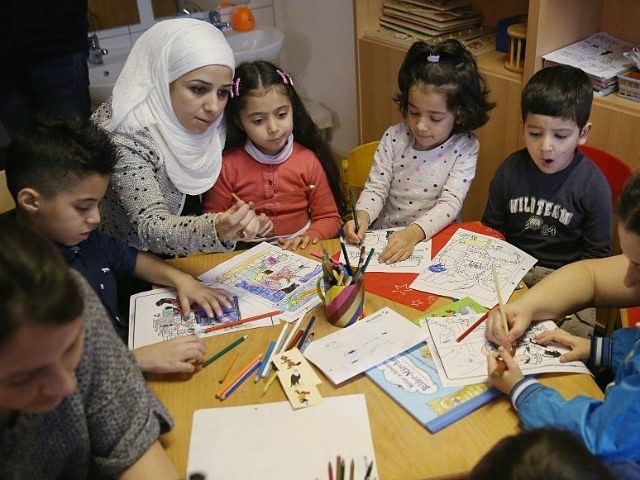Denmark has expanded integration laws by mandating language standards for migrant children and will stop benefits to parents who refuse to send their children to language classes.
Currently, three-year-olds from migrant families who do not attend preschool must take a language test. Children who are found to not have the age-appropriate level of Danish are required to attend preschool and receive additional language training.
This summer, the government will enact legislation whereby if the municipality determines a child from a “bilingual family” needs language stimulation but the parents are not still not sending the child to preschool child benefits (government family assistance), will be withdrawn, reports daily Swedish newspaper Sydsvenskan.
The law was considered in parliament and received a large majority of cross-party support from both the anti-mass migration Danish People’s Party (DF) and the left wing Social Democrats (SD). Politicians reason that children must learn Danish to be able to integrate into society and unless parents teach children Danish “society must assume [responsibility]”.
Preschool language tutors Jane Cronqvist and Methe Hansen, who work at the Væksthuset preschool in the district of Brønshøj, Copenhagen, told the daily newspaper children from migrant families are taught in small groups at a pace that is manageable for them, but “concentrated”.
“If they make many mistakes in a row we stop, so it doesn’t affect their self-esteem,” said Mrs. Hansen.
Ms. Cronqvist added, “It will be very concentrated and we require quite a lot of them. Everyone should get to repeat the words multiple times.”
Denmark has some of the highest integration expectations in Europe, where the country has already replaced state benefits with “integration benefits” for migrants, effectively cutting the payments in half, with conditions requiring new arrivals to speak Danish to an acceptable level before they can claim higher levels of support. The government has also made it significantly harder for migrants to obtain citizenship.
In the wake of the migrant crisis, Denmark’s parliament adopted reforms aimed at dissuading migrants from seeking asylum by delaying family reunifications. The law also allows authorities to seize valuables in an effort to alleviate Danish taxpayers of the financial burden of housing them.
Across the North Sea, integration efforts in Sweden are different. The fellow Scandinavian country does not prioritise the Swedish language in early years education, instead inscribing migrants’ mother tongues in the curriculum with “native [language] supporters” attending preschool and language classes.
“We have chosen a different way to go”, says Magdalena Karlsson, director of education at the National Agency, when she heard about the Danish rules for children from migrant families.
Karin Sandwall, director of the National Centre for Swedish as a second language at Stockholm University, believes that Swedish schools accommodating non-Swedish languages “strengthens the children’s identity” and “cooperation with the home”.
Last year, a charity backed by the Swedish government launched a campaign denouncing the assimilation of migrants into the native, Nordic culture and told Swedes to “integrate” with foreign “cultures and languages”.

COMMENTS
Please let us know if you're having issues with commenting.